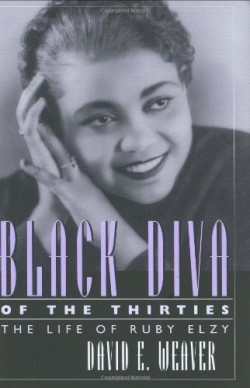Black Diva of the Thirties
The Life of Ruby Elzy
When we think of Black American operatic greats, Marian Anderson, Leontyne Price and Paul Robeson usually come to mind. Few have heard of Ruby Pearl Elzy, until now. At age four, Elzy burst into song while attending church in her birthplace, Pontotoc, Michigan. The congregation stared in amazement, foreshadowing the response of audiences at the White House, on Broadway, and in concert halls around the country. She sang operatic arias with the same poise, dramatic flair, and sincerity she employed when crooning the spirituals she learned from her great-grandmother.
Humble, Elzy never took full credit for her success. Instead she insisted that several important people were responsible for her accomplishments. Her mother, Emma, a teacher who worked several jobs to keep her children and extended family nourished, was the first to support Elzy in her endeavors. Though she could not afford it, Emma made arrangements for Elzy to pursue an education beyond the expected fifth grade. Elzy graduated high school with honors in 1926 and earned college credits the following year.
It was while doing what she loved best—singing—that she met another person who helped change the direction of her life: Dr. Charles C. McCracken. McCracken was in a meeting with the president of Rust College when he happened to hear Elzy’s voice from a room down the hall where she was practicing for a performance. McCracken found her voice and her pleasant demeanor appealing. When they met, however, he did not know he would play a number of roles in her life, including father figure, since her own father abandoned the family when Elzy was a child. As the author eloquently puts it, McCracken and Elzy “would forge one of the most unique collaborations ever undertaken in the annals of the music world.”
McCracken helped Elzy secure funding to attend Ohio State University, where he was a faculty member in the college of education. He became her manager, scheduling performances not only to help her earn enough money to take care of herself, but also to ensure that she would receive the publicity she needed to push her career forward. When Elzy graduated from Ohio State University, McCracken helped her obtain a Rosenwald Fellowship to attend Julliard.
In October of 1930, the “Magnolia in Manhattan” could sing in four languages (English, French, Italian, and German) and was already a full coloratura soprano. Once in New York, Elzy met another person who impacted her career, J. Rosamond Johnson, the brother of James Weldon Johnson. With his help, Elzy was performing on Broadway after being in the city for less than a week. From there she would go on to sing and act on stage and in films during the 1930s in memorable roles such as Dolly in The Emperor Jones and Serena in Porgy and Bess, a production that, Weaver claims, made the twenty-seven-year old woman a star.
An accomplished singer himself, Weaver has the experience and expertise, after a twenty-five-year career in the arts and broadcasting, to skillfully assess Elzy’s talent and her journey toward celebrity. He draws on meticulous research, including the original copy of a biography of Elzy that McCracken began (with Emma’s assistance) in the 1950s before he was diagnosed with heart disease. Weaver’s gift of storytelling is apparent. His tone, diction, and use of suspense make Elzy’s story compelling. Weaver’s personal interviews with those who knew, loved, and respected Elzy, as well as excerpts from detailed letters written and received by her, reveal the diva’s distinctive character and further indicate the author’s attempt to fully document her short life. His extensive research has an adverse affect only when he gives grave details about things (like Porgy and Bess and its creators) that seem to take the reader away from his subject.
However, in Weaver’s capable hands, Elzy comes to life as a person with whom readers can readily identify. When Elzy learns she has a benign tumor, readers share her pain as she prepares for a surgical procedure she will not survive. At age thirty-five, Elzy died on June 26, 1943. She left much work undone as she had become interested in helping the country move toward social change in spite of her indirect approach to dealing with racism.
Her commitment to the social causes of her day and her accomplishments as a Harlem Renaissance opera singer and actor warrant this well-written biography. Elzy’s is truly an American story. For those interested in opera, theatre or Black women’s studies, Weaver has forever altered the list of notable American performers.
Reviewed by
Kaavonia Hinton
Disclosure: This article is not an endorsement, but a review. The publisher of this book provided free copies of the book to have their book reviewed by a professional reviewer. No fee was paid by the publisher for this review. Foreword Reviews only recommends books that we love. Foreword Magazine, Inc. is disclosing this in accordance with the Federal Trade Commission’s 16 CFR, Part 255.

